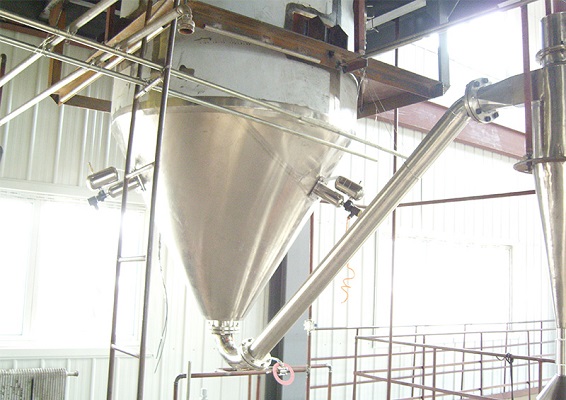How to choose the nozzle suitable for industrial spray drying machine?
 Feb 15, 2022|
Feb 15, 2022| View:639
View:639The spray drying technology of industrial spray drying machine is to use spray method to disperse the material in the hot air flow in the state of fog drops. The material fully contacts with the hot gas to complete the heat and mass transfer process instantly, so that the solvent (including water and organic solvent) rapidly evaporates into gas, so as to achieve the purpose of drying. Spray drying technology is widely used in China's pharmaceutical industry, in the field of oral solid preparation, often used in high heat sensitivity and easy to decompose in the process of liquid concentration drying. The product has fine particle size, uniformity, good fluidity and quick solubility.

There are many classification methods of industrial spray dryers, which can be divided into parallel flow, counterflow and mixed flow according to gas-liquid flow direction. According to the installation mode of the atomizer, it can be divided into up-spray down-type and down-spray up-type; According to the structure of the atomizer, it can be divided into centrifugal type, pressure type and air flow type. According to whether the heating gas is circulating, it can be divided into open, partially circulating and closed.
Specific requirements for selecting spray drying nozzles are as follows:
① Choose what liquid for spray drying, including raw materials, abrasive, corrosive, flammable, explosive, toxic. As different methods are used, a variety of nozzles should be considered.
② The engineer selects several equations of the application to formula the correct nozzle using the command required.
③ Many industry standard pressure nozzles operate at 3000-4000 PSI and 175-400F.
④ For other industries, greater pressure and temperature requirements.
Industrial spray dryer equipment - some processes benefit from pressures up to 10,000 p and other temperatures up to 600F, drying applications may require the benefit of custom geometry or materials. The nozzle engineer can communicate with your process engineer as necessary to provide the correct spray Angle for the nozzle to work, as well as the temperature and pressure depending on your nozzle material.








